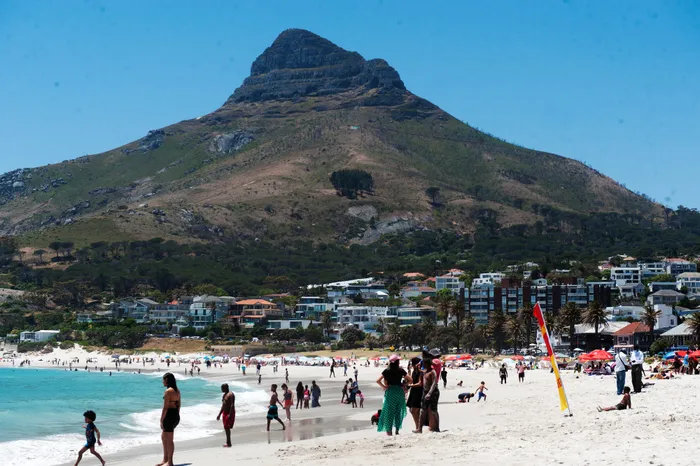Ratepayers demand action to end sewage contamination threatening Blue Flag beaches

Camps Bay beach is one the favourite beaches in Cape Town. File Pic: Courtney Africa/African News Agency(ANA)
PRESSURE is mounting on the City to deal swiftly with raw sewage pollution along the Atlantic seaboard and in lagoons and rivers.
A meeting in Camps Bay heard from experts, environmental activists and a marine conservation photographer that the sewage crisis in the city posed serious health, economic and environmental risks that could not be "ignored any longer".
The Camps Bay and Clifton 4 beaches have a Blue Flag status but have been plagued by sewage leaks since last year that led to temporary closures.
The Department of Forestry, Fisheries and the Environment (DFFE) has granted the City permission to continue pumping sewage into the ocean for the next five years, a decision that outraged residents and activists and sparked threats of legal action.
One of the environmental problems is allegedly caused by a pump station and deep-sea marine outfall pipe operated by the City in Camps Bay that discharges sewage into the Karbonkelberg “restricted zone”.
Councillor Paul Johnson said: "Fifty years ago a friend of mine and I used to surf around Glen Beach and we were literally swimming in human faeces, and with condoms.
“We developed sore and itchy eyes. When I walk my dogs in Mouille Point I can recognize that smell. This nose has never forgotten that smell, even though the City will often attribute it to red tide. But we know that smell.”
Aerial images taken by the marine conservation photographer Jean Tresfon between 2014 and 2022 along Table Bay, Hout Bay, Green Point and Camps Bay show large plumes of raw sewage in some spots.
Tresfon said: "Pumping millions of litres of raw sewage into the ocean is not a solution. We believe that sewage needs to be treated to acceptable levels before it's pumped into the sea. When I first raised the issue in 2015, the City blamed the plumes of passing ships.“
Tresfon also took a swipe at statements by councillor Alex Lansdowne who said he could find no contamination at Green Point beach and denied that the sewage disposed of was not being properly screened.
Said Tresfon: “If you can see bacteria with your naked eye, that's quite a feat. Either you're not clued up or you went on the day you knew the contamination was not to be there.”
Tresfon said any suggestions that the demand for action to remedy the situation was political was “laughable”.
In 2017, the City threatened two scientists and filmmakers commissioned by the Camps Bay and Clifton Ratepayers Association who spoke out about the contamination with a gag order. At the time the City argued that epidemiologist Dr Jo Barnes and environmental nano-chemist Leslie Petrik were “unscientific”.
At Thursday's meeting, Barnes reiterated that beyond the “tainted water” lay a health risk which threatened beachgoers including children who built castles in the sand, that could cause antibiotic resistance.
Barnes said: “The illnesses caused by the pollution are underestimated and the impact is worse than thought.”
Barnes said even though there was a known diarrhoea season in the metro, there was also a diarrhoea season linked to sewage.
“We are getting worried at the Tygerberg Hospital that we could lose the ability to treat infections.”
Although the City said that it was spending billions of rand on refurbishing wastewater treatment plants, and a proposed budget for the Potsdam plant was expected to be approved during the March council meeting, Barnes doubted that any work would be done on the marine outfalls in the next 20 years.
“We're chasing wind if the focus is on the bigger projects,” she said.
Petrik said university studies showed that 6.2 teragrams of nitrogen was being pumped into coastal ecosystems a year and the contamination had an impact on certain fish species.
“Sewage effluents are contaminated with chemicals and these have been shown to affect fertility levels.”
Petrik questioned how the City planned to repurpose drinking water from sewage and feed it into the distribution system when it had claimed that there was no known way to remove chemicals related to sewage.
She called on communities to convene a Permit Advisory Forum to lobby on environmental issues as the DFFE failed to conduct a public participation process before granting the City a permit.
The Milnerton Lagoon has also been heavily impacted by sewage spills which caused many fish species to die.
Rethink The Stink director Caroline Marx said: “Despite evidence that the effluent discharged from the Potsdam wastewater treatment plant exceeds permit levels, authorities have not taken any action to enforce the directives issued.
“Sewage pollution is widespread in Cape Town. We cannot rely on politicians to protect our environment. They have all failed dismally.”
The meeting called on the City to use its financial reserves to find land-based solutions to the environmental degradation and build a wastewater treatment plant to process effluent.
Lansdowne said a lot of work still needed to be done to improve the metro’s quality of water.
“There are serious challenges. Later this year a feasibility report we commissioned will be released which will also speak to alternatives to marine outfalls. There are new technologies that can be used as solutions.”
Civil engineer and filmmaker Mark Jennings called on the City to explore building a wastewater treatment plant as a solution to treating the effluent that was being pumped into the ocean.
“I was told that in 2022 that it could cost up to R150 million. The City collects sewage levies from us as ratepayers and in 2015 about R15 million was collected. The City has been collecting these levies for about 45 years and it has to use the money for what is intended - sewage treatment.”
Related Topics: